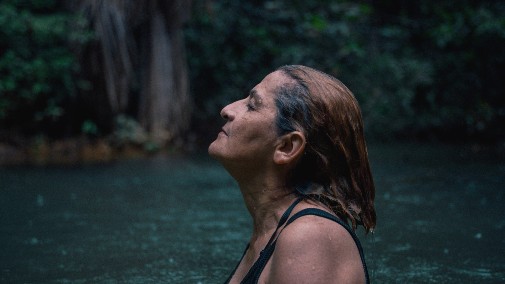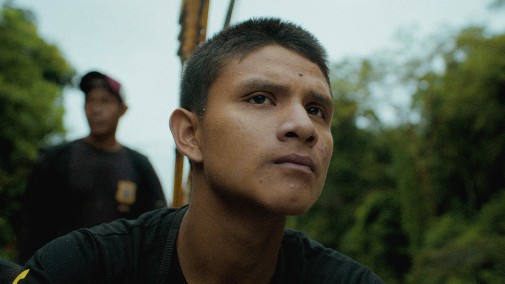Sundance: 'The Territory' is a winner!
 Sunday, January 30, 2022 at 10:20AM
Sunday, January 30, 2022 at 10:20AM 
Settlers fight their way into the land. Inspired by colonialist ideals of manifest destiny, they go on a journey of discovery and conquest. This is how new countries are born, with blades cutting down the wilderness and burning paths. However, the settlers are not alone. Deep in the mysterious unknown, indigenous people reside in a land that's been their home for millennia. These adventurers wear cowboy-like hats while their enemies, abstracted into an exotic other, fight with feathers in their hair. The two forces clash, but theirs is not a fight of equals. Invaders calling themselves heroes have numbers and firepower on their side, centuries-old systems built to perpetuate violent domination. Even their bodies carry weapons, sicknesses they spread to the natives, killing them in active genocide.
No, this is not an old-fashioned western of less enlightened days nor a chronicle of historical crimes. This is the story of our days. This is The Territory…
The Brazillian government first came into contact with the Uru-eu-wau-wau in 1980. Since then, this indigenous community of the Amazon rainforest has drastically dwindled. From thousands just a few decades ago, they're now reduced to a couple of hundred individuals. Lax legislation and even laxer policing have left them virtually defenseless against the forces of so-called progress. While they may have a vast portion of ancestral land, everything around has been decimated, trapping them in an island of green. Deforestation, burning, farming, and industrial agriculture have whittled down the world's lungs. In a time of climate catastrophe, the Uru-eu-wau-wau's battle against those who threaten their land is both a matter of indigenous human rights and an environmental crisis of global proportions.
American cinematographer turned documentary director Alex Pritz followed the situation across three tumultuous years, from Jair Bolsonaro's electoral victory to the COVID pandemic's first waves. What he captured is no inspirational tale with a comforting reassurance at the end. Instead, Pritz's film examines this modern turf war up close and at a distance, too. We're always keenly aware of his reality as an outsider who's benefited from colonial powers himself. Indeed, there's much to be said about how easily the illegal settlers confide to his camera, perchance convinced they're with an ally or someone they can talk into one. Furthermore, Pritz's way of looking at the forest is still full of wonderment, a curious gaze that catches on little details and doesn't let go. His are not the eyes of someone for whom this majesty is a common sight, a home.
Nevertheless, there are valid criticisms to be made about who gets to head such projects and tell these stories so intrinsically connected to an indigenous perspective. On the one hand, cinema is an empathy machine that should work as a tool of shared understanding, putting us in another's shoes. On the other, maybe The Territory would have been more uncomplicatedly virtuous if it was a product of the Uru-eu-wau-wau and the Uru-eu-wau-wau alone. They are credited as producers and, as the doc goes on, we see footage recorded by the Native forest protectors. Still, some would argue that's not enough, and they are not necessarily wrong. That being said, I can't say The Territory fails at what it's trying to do. Moreover, Pritz's lensing feels informed by a particular tenor of self-critical skepticism.

In that regard, it reminds one of Shirley Clarke's work more than it does other environmental documentaries. The Territory is, partly, about the wrongness of its story, the horror of its very existence, and need to exist. The comparison to westerns is encouraged by framing strategies, as is the implicit parallelism between these dynamics and the centuries of European colonialism in the Americas. The very essence of our storytelling devices and cinematic grammar stems from a history full of bloodshed, genocide, unlawful and unethical conquest. Consequentially, it feels especially significant when the Uru-eu-wau-wau do step behind the camera, weaponizing recording technology to expose the truth, combat their mortal enemies, and preserve traditions in danger of disappearing as older generations die.
Though I'm not too fond of non-fiction taking on the structural vices of fiction filmmaking, The Territory suggests the tension of a thriller without capitulating entirely to its narrative demands. One good element that comes from this is the individualization of voices. In other words, through patient observation, Pritz has highlighted specific characters and let them guide the documentary's emotional flow. That's true both for the usurpers and the usurped. While The Territory doesn't promote sympathy for the farmers, it does shine a light on their heterogenic claims to the Native land. Some shortsighted idealists make up collective associations, while others imagine themselves as modern explorers, all too happy to use violence to win their prize. However, the true protagonists are the Uru-eu-wau-wau, including those who take their fight outside the rainforest.
Environmentalist Neidinha Bandeira emerges as a weary voice of reason, long drained of hopefulness but never cynical. She's a veteran, and she's tired, quietly sobbing as the news of Bolsonaro's victory come on TV. She's also undefeated, mentoring the next warriors that will take on the fight—chief among them, The Territory's most fascinating figure – Bítáte. We meet him on the cusp of adulthood, still learning all that's entailed in the fight against settlers. As he grows, the boy made man is chosen by the community to lead the Jupau Association for strategic conservation, and we get a front seat to his heroism. Moreover, it's through Bítáte, who's seldom stepped outside his Amazonian kingdom, that the film expands on the monumental implications his home's destruction can have for Humanity in the long run.
As shot by Pritz and Tangae Uru-eu-wau-wau, cut by Carlos Rojas Felice, The Territory is a lean, mean thing, running under 90 minutes despite its epic scope. It's a cinematic experience defined by fury and urgency, starkly repudiating hollow optimism while leaving space for future redemption. When the camera regards Bítáte and the rest of the Uru-eu-wau-wau youths, there's even something akin to hope burning bright within the film's soul. Hope for change and hope for action. Hope that fuels the aggressive defense, the righteous resistance against annihilation.

The Territory won two awards at Sundance: The World Documentary Audience Award and a Special Jury citation for Documentary Craft.
 Alex Pritz,
Alex Pritz,  Brazil,
Brazil,  Reviews,
Reviews,  Sundance,
Sundance,  The Territory,
The Territory,  documentaries
documentaries 


Reader Comments (1)
nice post !!!
بهترین جراح بینی
بهترین جراح بینی در تهران
بهترین جراح بینی در تهران
بهترین جراح بینی در ایران
بهترین جراح بینی گوشتی
جراح بینی
عمل بینی
بهترین عمل بینی
بزرگترین جراح بینی
جراح بینی دست طلا
رینوپلاستی
عمل بینی عالی
بهترین جراح بینی استخوانی
بهترین جراح بینی گوشتی
بهترین جراح بینی
عمل بینی رینوپلاستی
thanks ..,